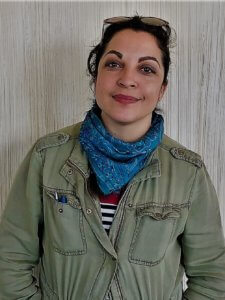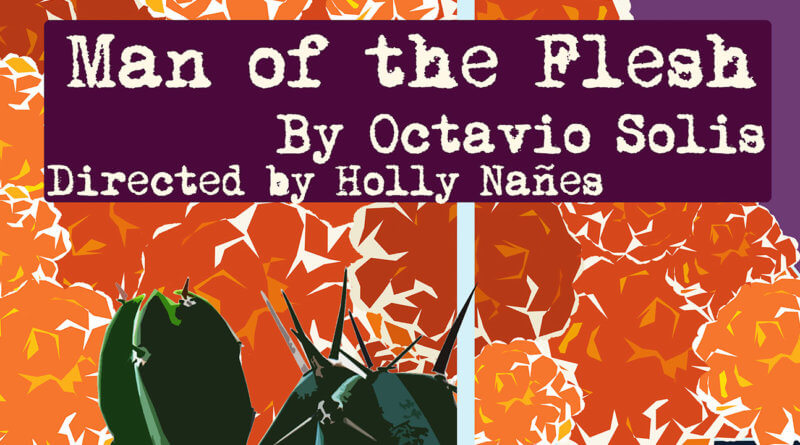Interview: Teatro Audaz Season Opener and Other News
Teatro Audaz is pleased to announce the first show of its 2021/2022 season — Man of the Flesh, a comedy written by Octavio Solis.
After almost two years of streaming solitude, the company is excited to be performing in front of live audiences once again. In anticipation of the season opener, ArtScene SA spoke to Laura T. Garza, the company’s co-founding Executive Artistic Director; Juan Calderon, Associate Artistic Director; and Holly Nañes, director of Man of the Flesh.
ArtScene SA: Tell us about the show and what’s happening with Teatro Audaz.

Laura T. Garza: First of all, I’d like to talk about our season in general. This season, we have a theme: “Familia es todo.” Family is everything, right? We decided to do that, especially with the last two years we’ve faced with COVID and everything. We just wanted to bring it back to what we feel is most important. In our culture, we really do hang tight to those words. Blood is thicker than water. No matter what happens — the good or the bad, the shadow or light, la familia is always going to be there. So all of our shows will have something to do with that theme — something to do with family life.
The first show is Man of the Flesh, written by Octavio Solis and directed by Holly Nañez. It is a modern comic adaptation of the first Don Juan play, The Trickster of Seville. There are some things in it that could be quite controversial, depending on how you look at it. But the way we decided to go with it — the reason we chose the show — well, I’ll let Juan talk to you about that. Then we can talk about how Holly was chosen as director, for a specific reason as well.
Juan Calderon: First of all, Octavio Solis is a very awesome playwright. One of the first plays I ever read was Lydia. One of the things about Man of the Flesh that I hadn’t read in a lot of Latino plays is the way he kind of goes after the toxic machismo of the lead character, and how that way of thinking and behaving can lead to so many tragedies and hurting so many people. It’s simply because of that pride that a lot of us Latino men are born with. Sometimes it feels like it’s something genetic. My generation is not only refusing to allow it to take over, but we’re actually trying to do something about it.

So when I read this play, I read it the terms of who I was in my early twenties to now, being in my mid-thirties, and the play had a totally different effect on me. And that effect went straight after that toxic machismo that plagues a lot of Hispanic men. So for me, it was a no-brainer to put that character out for the world to see, no matter how uncomfortable it might make some people. It’s the real truth about how some men walk around. It’s important to know that those types of people exist.
Laura: It’s a cautionary tale, really. But also it’s really funny. Juan, that you said it’s something you’re born with. In my mind, as a woman, I feel like it’s taught to you guys from a very young age.
Juan: Yeah.
Laura: Even us, as women — it’s taught to us, too. I grew up in a border town, and I was expected to stay in my place. You know what I mean? I was not above my brother or any male counterpart. It was always to serve.
So, Juan and I looked at the script and said, “Yeah, this is really good.” We want our theater to sometimes push boundaries and make people uncomfortable and have uncomfortable discussions. To hold a mirror up to life so they can see: “What are the consequences of actions like these?” We want this to be true of our theater company, and that’s why we are fearless, bold, audacious. That’s in our name!
My take on it was to find not only a great director but a new director. We want to get some new faces and utilize some up-and-coming local talent. But also a female director, because I wanted that perspective. I wanted to make sure we had that balance. Now I’m going to turn it over to Holly to talk about how she approached it.

Holly Nañes: As Laura said, some of the subject matter could be controversial in terms of machismo. The main character of Juan Tenorio sort of walks through the world tasking advantage of his status as a good-looking Latino man who has a lot of charisma. He woos women into engaging in sexual relations, and I think that Solis fearlessly tackles those tough issues.
The main character also has an absent mother. This is how he’s tackling his past; by not confronting his mother’s death. That translates to the way that he treats women. My take on it was, “Whoa! How am I going to deal with these controversial issues?” The ways some of the men taking advantage and some of the language in the play.
I had a conversation with my actors about how they felt about it. I mean, now that we’re in the Me Too movement, with women starting to step up in the theatrical world. How do we talk about these issues — about these plays that were written in the past — and bring them into the world now, in this political environment? It’s very important for me as a director that I address these issues, while also honoring the script and the play.
What we discover about Juan Tenorio is that he has some bitterness toward his mother. We have two types of women: the women in Tenorio’s world and the upper-class women in the Downey world. I thought it was important to address these class issues, because in the San Antonio environment, we have the biggest gap between the richest and the poorest.
This is what I had in my mind — the lawn service type, the working class man versus the richer world, and those women in the richer world. It was a discovery for me: Do I want to just continue telling that story of Juan takes advantage of women? What if the tables were turned, and now it’s the women who are taking advantage of Juan?
Juan has an ultimate goal. He wants to find his true love, and he chases after that dream. But he encounters all these obstacles in his way. And they are the Downey women that he encounters, and ends up having sexual relations with. So I kind of flipped the script a little bit. He’s still a Don Juan, but now he’s a Don Juan who’s trying to get to his goal. But he’s stymied by these strong and independent women who are free sexually and take control of the situation. That’s what I found interesting.
Octavio Solis was the first playwright I directed at Texas State was a graduate student. It was Lydia, and I feel like it’s come full-circle directing my first play out of grad school, and it’s Solis! I was really excited. I’ve worked with Laura and Teatro Audaz in the past, and I was honored to be given the opportunity to do it again.
Juan: Further to what Holly said, I was lucky enough to go to a rehearsal yesterday and watch the whole women empowerment thing and the way she was going with the play. I did this show before; I was Juan 15 years ago and I saw the character one way. I sat down with Holly and she talked about her vision of it. I really enjoyed the different take on it — the women being the ones in power.
I think that’s the sign or a really good play. You can have one play, but a bunch of people can study it a million times. They all enjoy it, but they all enjoy it for different reasons. It’s like what we do with Shakespeare — we see how many angles and approaches there are. That’s the beauty of this play, and we hope that’s what audiences will get, too. Who was at fault and who wasn’t at fault here?
There’s a reason why Juan Tenorio, the lead, has to be charming. It’s because you want to sometimes hate yourself because you’re laughing at one of his jokes, or you actually see his side of something. It’s just human nature, and we all have different opinions. That’s why Solis is so good at drawing that out of people.
Is this going to be streamed as well?
Laura: No. People are tired of watching a screen. There is such a thing as streaming fatigue, so we decided that this one would not be streamed. It’s only going to be for live audiences, unless anything drastic happens with COVID between now and when we open. Right now, we’re live audiences only, but our audiences are being limited to half-capacity. The maximum amount of audience per night is going to be 30. We’re taking as many precautions as we can. The actors are all required to wear masks during rehearsals and be vaccinated. Once we get closer to tech, they can rehearse without their masks, but for now, we want to be as safe as possible.
We’re trying our best to keep theater alive in the safest way we can. Because, you know, the last year really did hurt a lot of theater companies, including ourselves. You would have some people in the seats, but those watching at home would watch one or two, and then they just got tired of watching online plays. It’s not the same thing. It’s great, and it has its value, but it’s not the same as that experience that everyone goes to live theater for.
From audition to stage, that’s been a pretty short timeline. How has that been working out?
Laura: That’s one of the good things that came out of this whole COVID thing — having to do things through video and zoom. It’s the norm now to send in video auditions, and we were able to get those auditions in quickly. We already knew what our schedule was, so we were also able to get into rehearsal quickly.
Holly: I’d say the production process has been really good. We’ve had good communication across the board. We have a full design team, which is really nice. As Laura said, a lot of theater companies got hurt and are shutting down across the country. Here we are at Audaz, a small theater company that’s been around for five years now. Even through the pandemic, it’s still producing and creating opportunities for new designers, new actors and new directors like me.
Juan: To add to that, I think that one thing that goes unsaid in the creative community in San Antonio is the actors and creatives were all in a bunker, too, for a while. Whether you were a teacher having to instruct through zoom; whether you were a director on your way to directing your first play…I was a part of that, too. I was going to be in a show and everything got cancelled all at the same time. It makes you realize how much the creatives and actors here in town need the stage and need to be creative with other people as much as the audiences need to see shows. It really is a symbiotic relationship. We need that creative release, and it’s the same for the audiences as well.
Holly: It’s always nice to go out with friends and watch some quality work — “Hey, I’m going to see the new Audaz production!” — and afterwards go out into the world and have a conversation about it.
Laura: One last thing. With this one show, we’re running six days in a row. We usually do two weekends, but this is six days straight. It starts on Thursday, Oct. 28 and runs all the way through Tuesday, Nov. 2. We’re doing that because Nov. 2 is Dia de los Muertos and Man of the Flesh has a lot of Dia de los Muertos running through it. It actually has some significance to the play itself. We hope that our community will get behind it and come see it on Dia de los Muertos. We definitely want our audience to celebrate with us that night.
Man of the Flesh runs from Oct. 28 through Nov. 2, 2021 at 7:30 p.m. at the Cellar Theater, 800 W Ashby Pl. Tickets can be purchased here.




